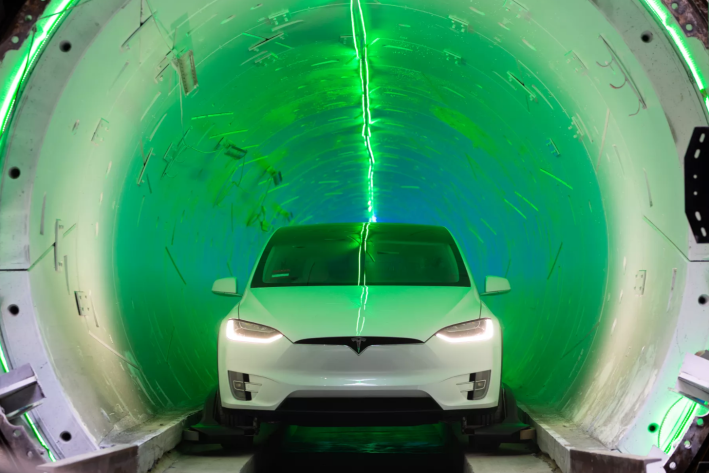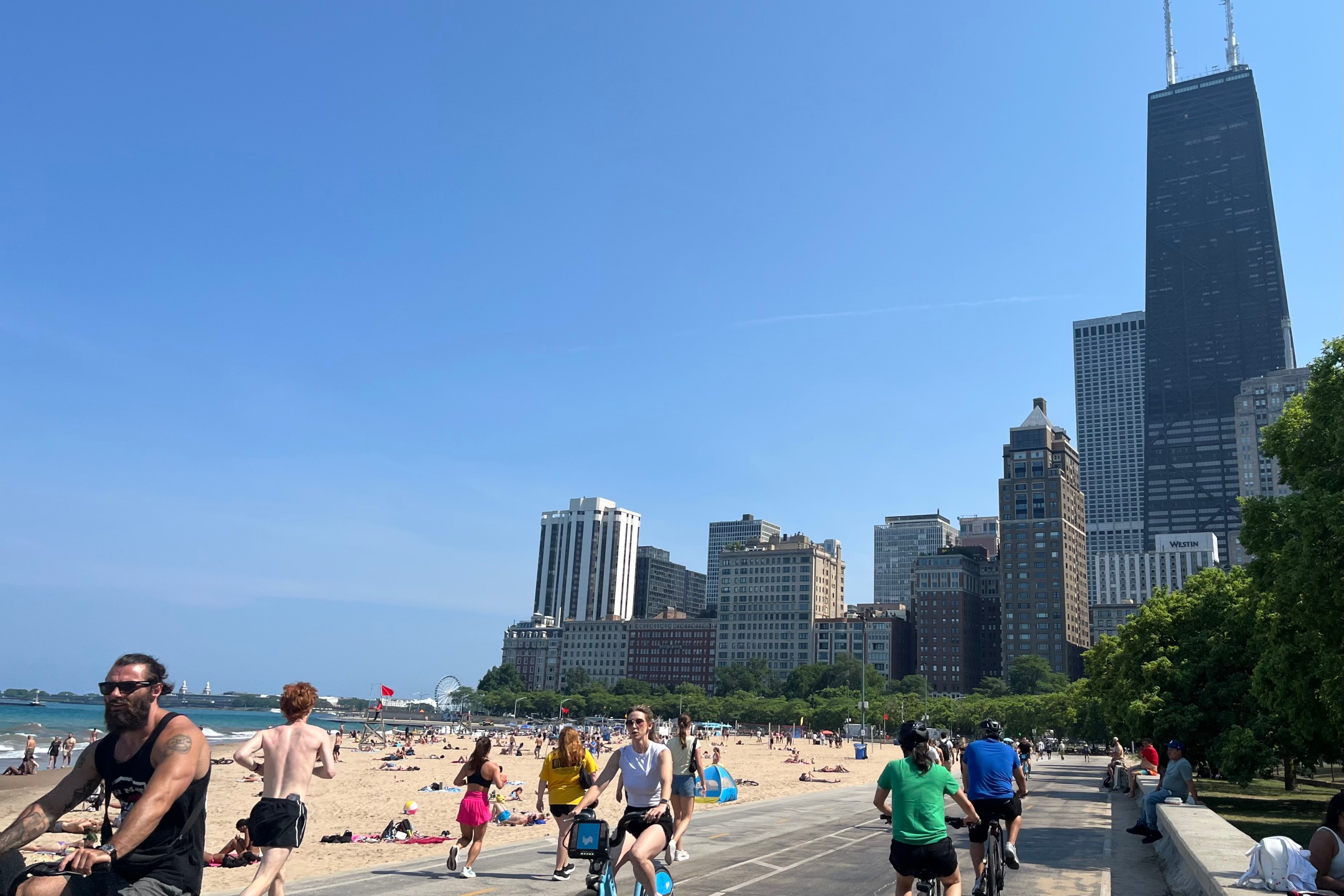[This piece also runs in the Chicago Reader.]
Update 2/27/19: With the elimination of Bill Daley, just about the only candidate who had anything positive to say about the O’Hare Express, from the mayoral election, the possibility of the project moving forward under the next mayor became much less likely. Both Toni Preckwinkle and Lori Lightfoot, the two mayoral hopefuls heading to the April 2 runoff, have thrown shade on Elon Musk’s proposal. In addition to Preckwinkle’s comment at a candidate forum that any transit investments should be focused on the CTA and Metra, Lightfoot previously told the Chicago Tribune that Musk’s and the Emanuel administration’s claim that taxpayers won’t wind up subsidizing the express is “a fiction.”
Last June current mayor Rahm Emanuel announced that the city had selected Musk's Boring Company to build and operate the airport transit system as a faster, cushier alternative to the Blue Line. The inventor says he'll use proprietary digging technology to tunnel some 18 miles from Block 37 to O'Hare at a fraction of the cost and time of conventional methods. Then, he claims, he'll shoot customers through the passage in 16-person pods at over 100 mph using "electric skate" technology, reducing the current 40-45-minute el trip time to a mere 12 minutes.
Musk says he can complete the project within 2 years for only $1 billion, and operate the system at a profit by charging $25 a ride. Both he and the city promise that there's no way the project could wind up costing taxpayers a dime.
Musk isn't known for truthfulness. Last year he allegedly committed securities fraud by tweeting about taking Tesla private, which cost him $20 million in a U.S. Securities and Exchange Commission lawsuit. He also baselessly tweeted that one of the Thai cave rescuers is a pedophile, resulting in an ongoing defamation lawsuit.
Most of the major mayoral candidates have voiced opposition to the O'Hare Express. “If we are going to make public transit investments, it should be to CTA and Metra,” Toni Preckinkle said at a January transit forum.
Musk's plan is "going to die on its own,” Gery Chico said during the event. "This thing is goofy."
“I’d kill it,” added Paul Vallas. “I can’t wait to kill it.”
The notable exception has been Bill Daley, who’s the most business-friendly candidate, and brother of ex-mayor Richard M. Daley, who tried and failed to build an airport express. While Bill Daley told the Tribune he has some questions about the project’s cost and fare structure, he also said Chicago shouldn’t fear innovation.
The current administration is hoping to ink its contract with the Boring Company before Emanuel leaves office in May. Last week Jennifer Martinez, spokesperson the Chicago Infrastructure Trust, which is representing the city in the negotiations told me, "Our goal is to present the City Council with a proposed contract that protects taxpayers and requires no taxpayer funding." She promised that, unlike Chicago’s disastrous parking meter deal, which Richard M. Daley pushed through the Council in a matter of days, there would be "adequate time for review and discussion before a vote is taken."
Martinez assured me that taxpayers won't be on the hook if the excavation impacts utility lines, buildings, or the water table; if the tunnel is left unfinished; or if the service proves unprofitable and the Boring Company decides to stop running it. She said the contract will include "financial and performance assurances that the city will be well-protected should any such instances occur."
Moreover Martinez said, if Musk builds the system and then decides to abandon it after failing to turn a profit, he'd be required to hand over the keys to the city. Chicago wouldn't be obliged to continue running the service, she said, but with no additional infrastructure costs or outstanding debt, "it is likely... the project will be of beneficial use and revenue-positive.”
Read the full text of my email exchange with Martinez here.
In December, Chicago officials attended a press event for a 1.14-mile tunnel the Boring Company dug in the Los Angeles area. While some of them were wowed by the demo, it consisted of bumpy rides in a Tesla Model X electric car, instead of the autonomous pods Musk had promised prior to the unveiling. And rather than using next-level tunneling technology, the company excavated the 12-foot-wide passage with an old tunnel boring machine, previously used to dig sewers in Oakland.

Despite this evidence that Musk's hypothetical technology doesn't actually exist yet, Martinez indicated that the city of Chicago is confident he can pull off the project at the promised cost and timeline. "The tunnel is a tunnel. The Boring Company is refining more efficient approaches to tunneling, which makes the economics of this project work."
So what do actual transportation experts have to say about all this?
DePaul transportation professor Joe Schwieterman argued that "there isn't a huge downside" in allowing Musk to take his moon shot. "Of course, there are many obstacles... but there is also the possibility that the Boring Company is willing to spent large amounts to prove the concept works."
Dr. P.S. Sriraj, head of UIC's Urban Transportation Institute is skeptical. "I'm apprehensive of how this will all play out," he said. "Even if the technology has been perfected and the service is up and running, will there be enough people to use it?"
Sriraj cited the cautionary tale of Union Pearson Express airport service, which saw dismal ridership until fares were slashed from about U.S. $20 to roughly $9, which will likely require tens of millions of dollars a year in taxpayer funds. He added that initial ridership projections for Denver’s A-Line airport train, which currently costs $10.50, were also overly optimistic.
Sriraj argued that a much more sensible strategy would be to simply convert two lanes of the Kennedy Expressway to car-free bus rapid transit lanes to provide speedy, non-stop service between downtown and O'Hare. "If it didn't work out, it wouldn't cost much to dismantle."
Musk's underwhelming LA tunnel demo "did nothing but raise more concerns" about the viability of the O’Hare Express, asserted a local transportation consultant, who requested anonymity for fear of professional blow-back. "It didn't address... passenger escape options and did not all present the skate technology and the safety of using lithium ion battery propulsion technology in a subway," he said. "It seems that they are proposing to use Chicago as a guinea pig for system that will likely fail."
Fritz Plous, spokesman for Corridor Capital a Chicago-based passenger rail development, finance and management company, is even more dubious of Musk’s scheme, which he called "the whims of an entrepreneur peddling an unproven new technology that he can't even be bothered to explain."
Plous argued that the whole idea of building transit that only runs between the airport and one downtown station is flawed. "Not that many O'Hare users go to the Loop, and Musk's tunnel has no intermediate stops in the neighborhoods, as the Blue Line does." He noted that many travelers are headed for River North, Streeterville, or the West Loop or South Loop. "When they disembark under Block 37 they'll still need a cab or an Uber -- so they'll probably just catch one at O'Hare instead."
In the short term, Plous said, the city should optimize the Blue Line by adding elevators to all stations to make them luggage-friendly (and wheelchair accessible.)
In the long term, he argued, we should implement the Midwest High Speed Rail Association's CrossRail proposal, which would involve connecting the southeast side's Metra Electric District line with the northwest side's North Central Service. "That would give travelers from South Bend to Rockford a fast, frequent, one-seat ride to O'Hare, with access to other important city destinations."
But, depending on the outcome of the election, Plous' beefs against the O'Hare Express may well be moot. "Rahm's days are numbered, and so, I believe, are the days of the Musk tunnel."



